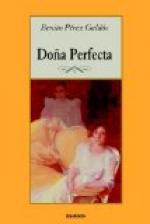“They talk nothing but nonsense in Madrid,” exclaimed the Centaur violently, accompanying his affirmation with a string of tongue-blistering vocables. “In Madrid there is nothing but rascality. What do they send us soldiers for? To squeeze more contributions out of us and a couple of conscriptions afterward. By all that’s holy! if there isn’t a rising there ought to be. So you”—he ended, looking banteringly at the young man—“so you are Dona Perfecta’s nephew?”
This abrupt question and the insolent glance of the bravo annoyed the young man.
“Yes, senor, at your service.”
“I am a friend of the senora’s, and I love her as I do the apple of my eye,” said Caballuco. “As you are going to Orbajosa we shall see each other there.”
And without another word he put spurs to his horse, which, setting off at a gallop, soon disappeared in a cloud of dust.
After half an hour’s ride, during which neither Senor Don Jose nor Senor Licurgo manifested much disposition to talk, the travellers came in sight of an ancient-looking town seated on the slope of a hill, from the midst of whose closely clustered houses arose many dark towers, and, on a height above it, the ruins of a dilapidated castle. Its base was formed by a mass of shapeless walls, of mud hovels, gray and dusty looking as the soil, together with some fragments of turreted walls, in whose shelter about a thousand humble huts raised their miserable adobe fronts, like anaemic and hungry faces demanding an alms from the passer-by. A shallow river surrounded the town, like a girdle of tin, refreshing, in its course, several gardens, the only vegetation that cheered the eye. People were going into and coming out of the town, on horseback and on foot, and the human movement, although not great, gave some appearance of life to that great dwelling place whose architectural aspect was rather that of ruin and death than of progress and life. The innumerable and repulsive-looking beggars who dragged themselves on either side of the road, asking the obolus from the passer-by, presented a pitiful spectacle. It would be impossible to see beings more in harmony with, or better suited to the fissures of that sepulchre in which a city was not only buried but gone to decay. As our travellers approached the town, a discordant peal of bells gave token, with their expressive sound, that that mummy had still a soul.
It was called Orbajosa, a city that figures, not in the Chaldean or Coptic geography, but in that of Spain, with 7324 inhabitants, a town-hall, an episcopal seat, a court-house, a seminary, a stock farm, a high school, and other official prerogatives.
“The bells are ringing for high mass in the cathedral,” said Uncle Licurgo. “We have arrived sooner than I expected.”
“The appearance of your native city,” said the young man, examining the panorama spread out before him, “could not be more disagreeable. The historic city of Orbajosa, whose name is no doubt a corruption of Urbs Augusta, looks like a great dunghill.”




